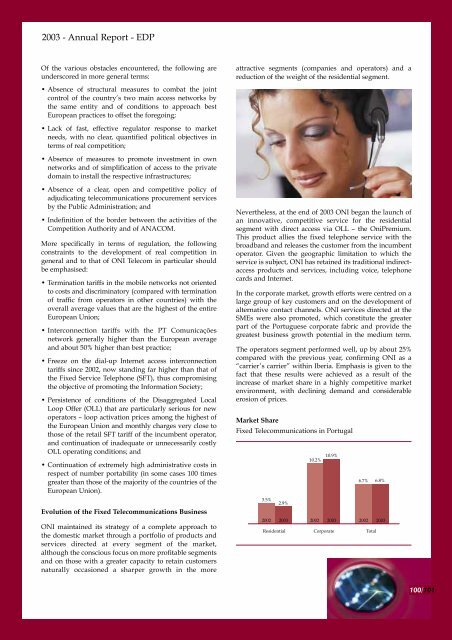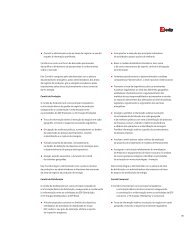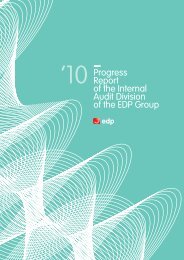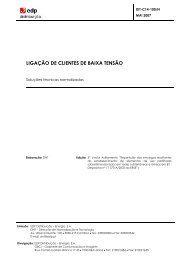business plan for 2004 - EDP
business plan for 2004 - EDP
business plan for 2004 - EDP
You also want an ePaper? Increase the reach of your titles
YUMPU automatically turns print PDFs into web optimized ePapers that Google loves.
2003 - Annual Report - <strong>EDP</strong><br />
Of the various obstacles encountered, the following are<br />
underscored in more general terms:<br />
• Absence of structural measures to combat the joint<br />
control of the country’s two main access networks by<br />
the same entity and of conditions to approach best<br />
European practices to offset the <strong>for</strong>egoing;<br />
• Lack of fast, effective regulator response to market<br />
needs, with no clear, quantified political objectives in<br />
terms of real competition;<br />
• Absence of measures to promote investment in own<br />
networks and of simplification of access to the private<br />
domain to install the respective infrastructures;<br />
• Absence of a clear, open and competitive policy of<br />
adjudicating telecommunications procurement services<br />
by the Public Administration; and<br />
• Indefinition of the border between the activities of the<br />
Competition Authority and of ANACOM.<br />
More specifically in terms of regulation, the following<br />
constraints to the development of real competition in<br />
general and to that of ONI Telecom in particular should<br />
be emphasised:<br />
• Termination tariffs in the mobile networks not oriented<br />
to costs and discriminatory (compared with termination<br />
of traffic from operators in other countries) with the<br />
overall average values that are the highest of the entire<br />
European Union;<br />
• Interconnection tariffs with the PT Comunicações<br />
network generally higher than the European average<br />
and about 50% higher than best practice;<br />
• Freeze on the dial-up Internet access interconnection<br />
tariffs since 2002, now standing far higher than that of<br />
the Fixed Service Telephone (SFT), thus compromising<br />
the objective of promoting the In<strong>for</strong>mation Society;<br />
• Persistence of conditions of the Disaggregated Local<br />
Loop Offer (OLL) that are particularly serious <strong>for</strong> new<br />
operators – loop activation prices among the highest of<br />
the European Union and monthly charges very close to<br />
those of the retail SFT tariff of the incumbent operator,<br />
and continuation of inadequate or unnecessarily costly<br />
OLL operating conditions; and<br />
• Continuation of extremely high administrative costs in<br />
respect of number portability (in some cases 100 times<br />
greater than those of the majority of the countries of the<br />
European Union).<br />
Evolution of the Fixed Telecommunications Business<br />
ONI maintained its strategy of a complete approach to<br />
the domestic market through a portfolio of products and<br />
services directed at every segment of the market,<br />
although the conscious focus on more profitable segments<br />
and on those with a greater capacity to retain customers<br />
naturally occasioned a sharper growth in the more<br />
attractive segments (companies and operators) and a<br />
reduction of the weight of the residential segment.<br />
Nevertheless, at the end of 2003 ONI began the launch of<br />
an innovative, competitive service <strong>for</strong> the residential<br />
segment with direct access via OLL – the OniPremium.<br />
This product allies the fixed telephone service with the<br />
broadband and releases the customer from the incumbent<br />
operator. Given the geographic limitation to which the<br />
service is subject, ONI has retained its traditional indirectaccess<br />
products and services, including voice, telephone<br />
cards and Internet.<br />
In the corporate market, growth ef<strong>for</strong>ts were centred on a<br />
large group of key customers and on the development of<br />
alternative contact channels. ONI services directed at the<br />
SMEs were also promoted, which constitute the greater<br />
part of the Portuguese corporate fabric and provide the<br />
greatest <strong>business</strong> growth potential in the medium term.<br />
The operators segment per<strong>for</strong>med well, up by about 25%<br />
compared with the previous year, confirming ONI as a<br />
“carrier’s carrier” within Iberia. Emphasis is given to the<br />
fact that these results were achieved as a result of the<br />
increase of market share in a highly competitive market<br />
environment, with declining demand and considerable<br />
erosion of prices.<br />
Market Share<br />
Fixed Telecommunications in Portugal<br />
3.5% 2.9%<br />
2002 2003<br />
10.2% 10.9%<br />
6.7% 6.8%<br />
2002 2003 2002 2003<br />
Residential Corporate Total<br />
100/101

















